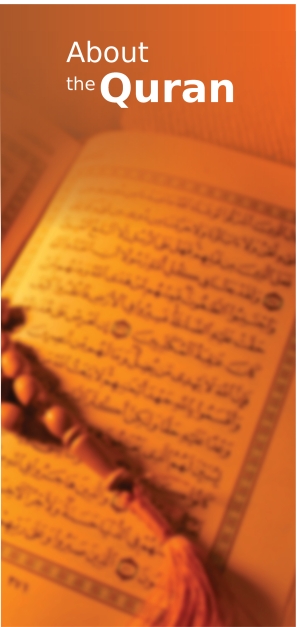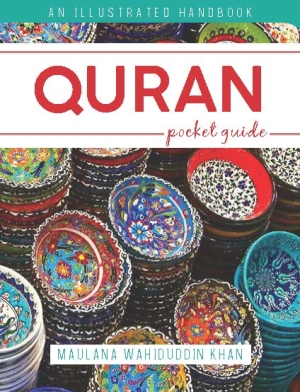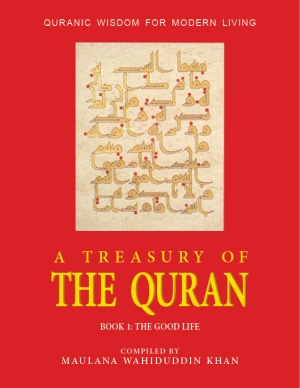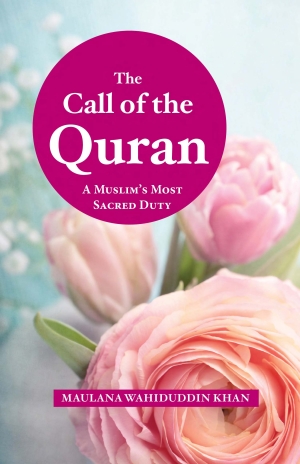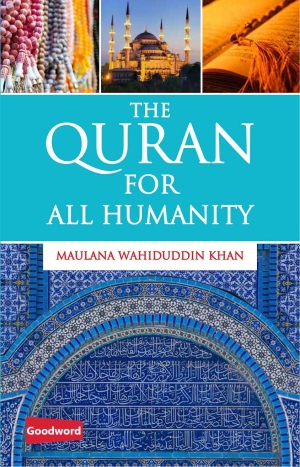The message of the Quran is the Creation plan of God. That is, to tell man why God created this world, what the purpose is of settling man on it, what is required from man in his pre-death life span, and what he will confront after death. According to the Creation Plan of God, man is born as an eternal creature, and his life span has been divided into two periods, the pre-death period, which is a time of trial, and the post-death period, which is the time for receiving the rewards or punishment merited by one's actions during one's lifetime. God has given man complete freedom in this world. This freedom has been given to man, not as a matter of right but as a trial. On the outcome of this test rests the eternal fate of man. These take the form of eternal Paradise or eternal hell. The Quran makes man aware of this reality.
Man is a seeker by birth. The Quran is the answer to man's quest. According to the Quran, the present world is the testing ground, and whatever man has been endowed with in his pre-death period is all a part of the test. The Hereafter is the place where the result of the test will be taken into account by the Almighty, and whatever man receives in the life after death, by way of reward or punishment, will be commensurate with his deeds in this world. Therefore, the secret to man's success in this life is to discover God while He is unseen, understand His creation plan and map out his life accordingly.
Featured Articles
Featured Videos
FAQs
The Quran is a book of divine warning, a combination of lessons and admonitions. It would be even more appropriately called a book of wisdom. The Quran does not follow the pattern of the traditional didactic book. In fact, when the average reader picks up the Quran, it appears to him to be a collection of fragmentary statements. Apparently, this feeling is not unreal. But this arrangement of the Quran is not due to any shortcoming but is rather in conformance with the Quranic plan of retaining its original form in order to fulfill its purpose of conveying the message of truth to the reader who may, in his forays into the scriptures, read only one page, one verse or one line at a time.
One vital aspect of the Quran is that it is a reminder of the blessings granted by the Supreme Benefactor. The most important of these are the exceptional qualities with which God endowed man when He created him. Another great blessing is that He settled him on the earth, a planet where all kinds of support systems existed for his benefit. The purpose of the Quran is to ensure that, while enjoying these blessings of nature, man will keep his Benefactor in mind: he must acknowledge the munificence of his Creator. It is in so doing that man will gain entry into eternal paradise; ignoring his Benefactor, on the other hand, will lead man straight to hell. The Quran is indeed a reminder of this inescapable reality.
Source: The Quran (Introduction)
The Quran is not a book in the ordinary, accepted sense of the word. It is more an account of the final struggle to convey the message of Islam. From the most ancient times, God has been sending down the knowledge of the truth through His specially chosen emissaries. In the seventh century of the Christian era, it was God’s will that the inhabitants of the Earth should quite finally be provided with Knowledge of Truth and that a society should be founded on the basis of that Knowledge which would be a source of enlightenment and an example for the whole human race until the Last Day.
The Quran is the most authentic record of the True Call, raised in Arabia by the Final Prophet, who was guided right throughout his prophethood by God Himself. It is a collection of divine instructions, issued for the guidance of this movement at different times over nearly a quarter of a century. But the Quran is not merely a historical record. It is a divine proclamation, valid for all time, and cast in historical mould in order to be presented meaningfully to mankind. It is also a permanent proclamation in that it will decide the fate—good or bad—of human beings in every epoch, in accordance with the will of God.
Source: Quranic: An Abiding Wonder
The Quran, addressed to humankind, tells us of God’s scheme for human existence—man is placed on earth for the purpose of being tested. The freedom he is given here is not as a matter of right but as a matter of trial. On the outcome of this test, rests the eternal fate of man. The Quran asserts that human beings are eternal creatures, yet only an extremely small part of their lifespan has been assigned to this present world, the remainder is ordained for the Hereafter. As we learn from the Quran, all the revealed books were sent by God so that man might be informed of the nature and purpose of his life. The teachings of the Quran can be summed up under two basic headings:
1. Believing in one God and worshipping Him alone.
2. Regarding all human beings as equal and according them equal rights.
The Quran was revealed as circumstances demanded and not in a purely theoretical way. It enshrines only the basic teachings of Islam. The detailed application of these teachings is to be found in the sayings and actions of the Prophet Muhammad.
The most repeated invocation in the Quran is “In the name of God, the most Beneficent, the most Merciful.” The occurrence of this invocation 114 times in the Quran is in itself an indication of its importance. Every piece of work must have a beginning. It is the Quran’s desire that when one initiates any undertaking one should begin by uttering the name of God. One is thus always reminded of God’s attributes of benevolence and compassion.
Source: Spirit of Islam May 2018








